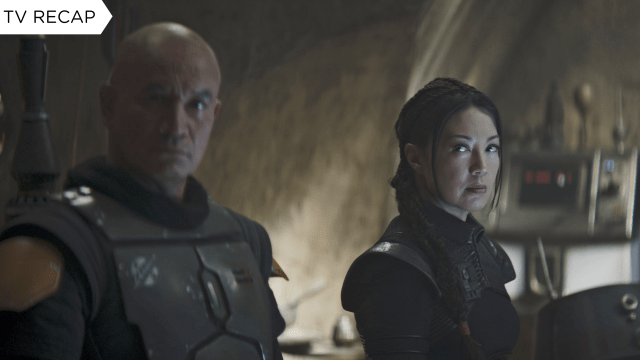When The Book of Boba Fett began, I posited that the show’s strength was that it already knew who its titular character was. But as the series sets the stage for its conclusion, it has lost that self-assurance — and almost entirely lost the point of being a series about Boba Fett.

If last week’s “Return of the Mandalorian” was a surprise sideways step into a strong episode of The Mandalorian instead of The Book of Boba Fett, then “From the Desert Comes a Stranger” is an altogether more surprising step into a messy episode of The Mandalorian. Now that the show doesn’t have last week’s singular focus on Pedro Pascal’s Din Djarin, the penultimate chapter of The Book of Boba Fett only further exemplifies the weaknesses of the series by offering a dense and wearying journey through cameos of many, many, many more familiar faces.
“From the Desert Comes a Stranger” straddles two desires, neither of which is to show what The Book of Boba Fett’s titular main character is up to as the shadow of the Pyke Syndicate continues to fall across Mos Espa.
The lesser of the two desires is at least tangentially related to the show’s supposed “plot” — bringing back Timothy Olyphant’s Cobb Vanth, as his community is visited by the long arm of the Pykes in the form of Clone Wars and Bad Batch antagonist Cad Bane (voiced by Clone Wars actor Corey Burton and physically portrayed by Dorian Kingi), who is now enforcing the syndicate’s grip on the desert world. When Vanth has to weigh the consequences of standing up for the people he’s come to defend, and an offer (delivered by Din) to side with Boba, the show manages to at least nod to the personal costs of Boba’s conflict with the Pykes.

But The Book of Boba Fett’s main desire is to provide a sombre and frustrating epilogue to The Mandalorian’s season 2 climax. Before Din commits to aiding Boba, he wants to settle things left unsaid with his former foundling Grogu, now in the early days of his re-training as a Jedi padawan. What this means is another encounter with Luke Skywalker (again a visual effects hybrid of Mark Hamill’s vocal talents and a stunt performer, this time Graham Hamilton), and even Ahsoka Tano (the returning Rosario Dawson). Din finds himself confronted with the Jedi’s infernal idea of stigmatised attachments. He is forced to watch from afar as Grogu trains under Luke, and to deal with the lingering hypocrisy of the Jedi Order, which echoes through the actions of force users the Order left to fend for themselves, spiritually and literally.
It’s a strange, surreal, and extended sequence, taking up most of the runtime of “From the Desert Comes a Stranger.” We watch it unfold in an almost cloyingly nostalgic sweetness — Ahsoka Tano, hero of the Clone War, next to Din Djarin, as they watch Luke Skywalker, Jedi Knight, become a master to a small, excitable green child with shades of the legendary Yoda. It’s strange because there’s a peculiar sense of conflict and melancholy, as we see the roots of lessons learned by Ahsoka and Luke in the past emerge in repeated mistakes, mistakes we know that one day will lay this fledgling Jedi Academy low.

We see Ashoka chide Din for expecting Grogu to sacrifice his tutelage in order to reconnect with him, even as she tells him that her reason for being at the site of Luke’s future temple is that she’s “an old friend of the family,” washing her hands of the Jedi’s future while also standing in the heart of that future herself, unable to let go of her own personal connections. There’s a joy in watching Luke, who knows no other way at this point, returning to the lessons and exercises Obi-Wan and Yoda sought to teach him with as he trains Grogu, but also a sadness in that he embraced his old masters’ hardline dogmas — offering the youngling the choice of either a life with the Jedi, in the gift of Yoda’s own lightsaber, or a return to his adoptive father, represented by the Beskar chainmail shirt Din left behind as a parting act of love, as if there were no middle ground for Grogu to take.
It’s that compelling, dangerously nostalgic mix we saw in Luke’s first Mandalorian appearance, extrapolated: The push and pull of seeing Luke at his most luminescent as a Jedi; the tragedy of setting the stage for his eventual crisis of faith in The Last Jedi; and a strand of frustration that current Star Wars storytelling is still intrinsically chained to the Skywalkers.
But again, despite whatever fleeting satisfaction we might get from concluding plot lines left open at the end of The Mandalorian season 2, this episode suffers because it pulls us away further and further from the story of The Book of Boba Fett. From the scattershot push and pull of using Cobb Vanth and Cad Bane as cameo bookends, to the insistence on showing Din’s resigned acceptance of leaving Grogu behind while also relishing in showing Luke’s tutelage of the child, “From the Desert Comes a Stranger” is bursting with too many ideas from Star Wars’ past. Too few of them are there in order to inform the show’s own understanding of its purported protagonist.

Perhaps its a question of expectations. Would the stories told in “From the Desert Comes a Stranger” feel stronger, work better, if they weren’t in a show named for a specific character that these stories almost entirely eschew? It’s hard to say, and that’s in part because The Book of Boba Fett — and all Star Wars live action television, including the Mandalorian season 2 and upcoming series like Ahsoka, Obi-Wan Kenobi, and Andor — has decided that the price of Star Wars’ fondness for intertextuality is allowing its protagonists to become less distinct characters and more like hollowed chess pieces.
Maybe chess is too kind an allegory for its grand design, too much a suggestion of a layer of strategy. The pieces of a game of chutes and ladders would be more appropriate: an uphill struggle as defined as much by sharp ascendance as it is by dizzying, spiralling retreats backwards.
Star Wars’ galaxy, as small as it can be at times, is more interconnected and tightly woven across its myriad parts that ever before, lending a weight of consequence to even the slightest event. But that tight weave has left little room for characters to do anything more than bounce between conflicts because they’re so constricted they have nowhere else to go. So constricted that the moment you think that a character, or an idea, will be given time to breathe and stretch naturally, it is cut off by the other parts of that weave encroaching on its narrative focus.

Thankfully, about five minutes of “From the Desert Comes a Stranger” do realise that there should be some level of forward momentum coming into next week’s final episode, even if it continues to barely focus on its titular character. As the Pyke syndicate makes its first moves — tasking Cad Bane with scaring off anyone who’d side with Boba Fett, starting with Vanth, while making more direct threats in the form of an explosive attack on Garsa Fwip’s Sanctuary — the stage is set for Boba and his motley crew to fight for what little of their own they’ve managed to carve out in Mos Espa. It shouldn’t have to feel like they’re fighting their own show to do that.
Next week, at last, we’ll get to see what’s in store for Boba as he takes a stand for what he has come to believe in over the course of The Book of Boba Fett. But what has Boba come to believe in, in a series that has paved the way for this finale by largely casting him aside? In a show that has become increasingly disinterested in its lead character — beyond evolving him from what it established with such confidence seven weeks ago — it’s hard to say. It’s even harder to imagine that Boba’s big stand will be worth this entire endeavour.
